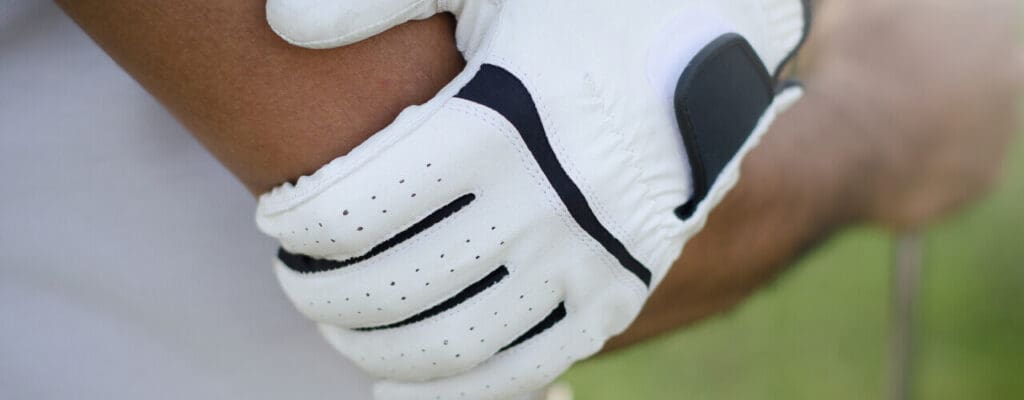How Physical Therapy Can Help Golfers Resolve Golfers’ Elbow

Are you struggling with a bad case of golfers’ elbow, but you never play golf? Is the pain limiting basic activities you do around your home or at work? At Agility Physical Therapy our physical therapists will assess your pain and limitations to provide you with solutions that work!
Whether you play golf or not, you can resolve your pain and get back to doing what you love with a proactive program. This is especially true with a tendon injury like with golfers’ elbow (i.e., medial epicondylitis).
Golfers’ elbow can affect simple activities of daily living like carrying objects, opening a door or jar, and shaking someone’s hand. Fortunately, at Agility Physical Therapy our team of physical therapists will identify all the factors contributing to your pain and each limitation until you are back to doing what you have been avoiding.
Taking care of minor issues sooner than later leads to a faster recovery. Request an appointment today with one of our highly trained specialists and let us help you with proven techniques!
Table of Contents
ToggleWhat is golfers’ elbow, and what causes it?
In the medical community, golfers’ elbow, also known as medial epicondylitis, is typically caused by an overuse and/or overload injury to the tendons that attach to the elbow’s inner (medial) aspect. This overload often leads to degenerative tearing of the tendons, pain, and sometimes inflammation.
Typically this condition does not occur on one specific swing in golf. Often, repeated microtraumas over the course of days to weeks will lead to the development of pain. Eventually, these repeated microtraumas lead to structural breakdown of the tissue and dysfunction of the elbow/arm. As the condition progresses, there is often persistent pain on the inner aspect of the elbow, even with basic daily activities.
It is also possible for medial epicondylitis to start due to a traumatic event. This can happen when the club strikes the ground, roots, or dig into the sand. These types of strikes can cause a sudden slowing/stop of the club resulting in sudden overloading of the tendons at the elbow.
Regardless of the mechanism of injury, our physical therapists will get to the root of the problem. At Agility Physical Therapy, our team will help you resolve any golf-related injury so you can get back out on the course!
How physical therapy at Agility Physical Therapy can help
Too often, golfers wait too long to address an issue when it is small or use strategies that simply don’t help the condition and may unintentionally inhibit the recovery process. For example, resting a tendon is not the most effective strategy and may delay healing.
Tendons are designed to withstand large forces, and resting them can actually weaken them further and may even make you more susceptible to re-injury. This is where a physical therapist can help! In addition, we understand proper swing mechanics and the importance of looking at the entire body to ensure you address all factors contributing to your condition.
Our physical therapists can teach you how to safely use and strengthen your tendon to keep it healthy and strong while it heals. In addition, we will help ensure the rest of your body is mobile and strong so you can swing with confidence.
What to expect in physical therapy
At Agility Physical Therapy we will conduct a thorough evaluation that includes learning how long you have dealt with your injury (i.e., traumatic vs. overuse/chronic). This will help us identify the extent of the injury and help us design a program that is tailored to meet your individual needs.
Initially, our team will use modalities and manual therapy techniques to provide pain relief. The focus, in the beginning, is to restore mobility and increase blood flow to assist the healing process. An active rehabilitation program that gradually loads the tendon to regain its strength and function fully is necessary as the condition improves.
Our team will build strength by progressively “loading” the tissue in the injured area. Loading is a term used to describe the cumulative amount of exercise over a given period. At Agility Physical Therapy, we will progress your loading with the addition of repetitions, sets, resistance, duration, and/or speed. Any combination of progressions will help the golfer tolerate the forces required to swing the club repeatedly.
The goal of tendon rehabilitation is to gradually progress the exercises to challenge the tendon without irritating it further. We will educate you on modifying your technique and improving your form golfing and any other activity that may provoke your condition.
Request an appointment at Agility Physical Therapy today!
No matter what type of pain or injury you may be dealing with, our team of physical therapists has proven success and can help you resolve your problem once and for all!
Call today to schedule an appointment with one of our specialists!
Sources:
- https://www.jospt.org/doi/10.2519/josptcases.2021.9980
- https://www.ncbi.nlm.nih.gov/books/NBK519000/
- https://www.ncbi.nlm.nih.gov/books/NBK557869/
- https://dspace.rsu.lv/jspui/handle/123456789/2786
